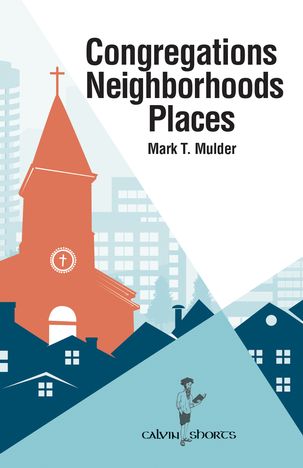
“When we expand ‘neighbor’ to ‘neighborhoods’ and when we move from merely being nice to our next-door neighbor to thinking about creating better neighborhoods, we find that being a good neighbor is harder than we thought.” – Mark. T. Mulder[1], Congregations, Neighborhoods, Places (16).
Thank-you to Calvin College Press for sharing Mulder’s “attempt to think with congregations, particularly congregations in cities, about how social science can both help churches become more aware of themselves and of those who live around them” (19). Congregations, Neighborhoods, Places took me back to my decade of serving InterVarsity Christian Fellowship / USA in Pittsburgh, during which I was part of Allegheny Center Alliance Church and the network of people connected with the Pittsburgh Leadership Foundation. Yes, “neighborhoods matter dearly. The nature and structure of a neighborhood and the opportunities it offers or withholds affects everyone who lives there” (19).
As a genre, I appreciate the focused nature of Calvin Shorts. In this piece, Mulder offers a much needed critique of the “boutique” / “segregated” / “clustering” approach to congregational growth and life (48). We are called to love and care for our neighbor(s). Furthermore, he voices the importance of local congregations collaborating with focused services, other local congregations, and neighbors in the pursuit of transformation / justice. No, even a highly motivated and resourced local congregation can’t do it all on their own. Furthermore, each local congregation has a unique story and place.
Today, let us pray for the people of God to embrace and practice loving their neighbor with their head, heart, and hands. May we see this love worked out this week in the neighborhood of the local congregation and the places where members of the congregation are sent. I commend Congregations, Neighborhoods, Places as a conversation starter on campus and at local congregations for those seeking to truly love their neighbor. In the meantime, a few questions for reflection and conversation with the people of God:
- Who are your neighbors on campus, in the community where you live, study, work, and worship?
- Take a few minutes to pray for your neighbors . . .
- How do you and ministries with which you participate, love your neighbors / neighborhood in a “real” manner? What some of the stories of the “ripple effects” of this love?
- Give praise to God . . .
- Do you consider yourself part of the “glue” and / or the “fresh eyes” of your neighborhood (possibly your field of study)? How can / should you grow in this area? How can / should your local congregation and / or campus ministry grow in loving your neighbors?
- Note: As I reflect upon InterVarsity Christian Fellowship / USA and the various local congregations of which I have been a member, I have great respect for those who are the “glue.” They are seldom “celebrities.” They have been present through the thick and thin for a long time. They are foundational. But as you may guess, I really enjoy conversation and collaboration with “fresh eyes” who come to the table as we grow in loving our neighbor. To God be the glory!
Notes
[1] Calvin College’s Department Chair, Professor, Adjunct Professor, Congregational and Ministry Studies
Tom enjoys daily conversations regarding living out the Biblical Story with his wife Theresa and their four girls, around the block, at Elizabethtown Brethren in Christ Church (where he teaches adult electives and co-leads a small group), among healthcare professionals as the Northeast Regional Director for the Christian Medical & Dental Associations (CMDA), and in higher ed as a volunteer with the Emerging Scholars Network (ESN). For a number of years, the Christian Medical Society / CMDA at Penn State College of Medicine was the hub of his ministry with CMDA. Note: Tom served with InterVarsity Christian Fellowship / USA for 20+ years, including 6+ years as the Associate Director of ESN. He has written for the ESN blog from its launch in August 2008. He has studied Biology (B.S.), Higher Education (M.A.), Spiritual Direction (Certificate), Spiritual Formation (M.A.R.), Ministry to Emerging Generations (D.Min.). To God be the glory!

Leave a Reply